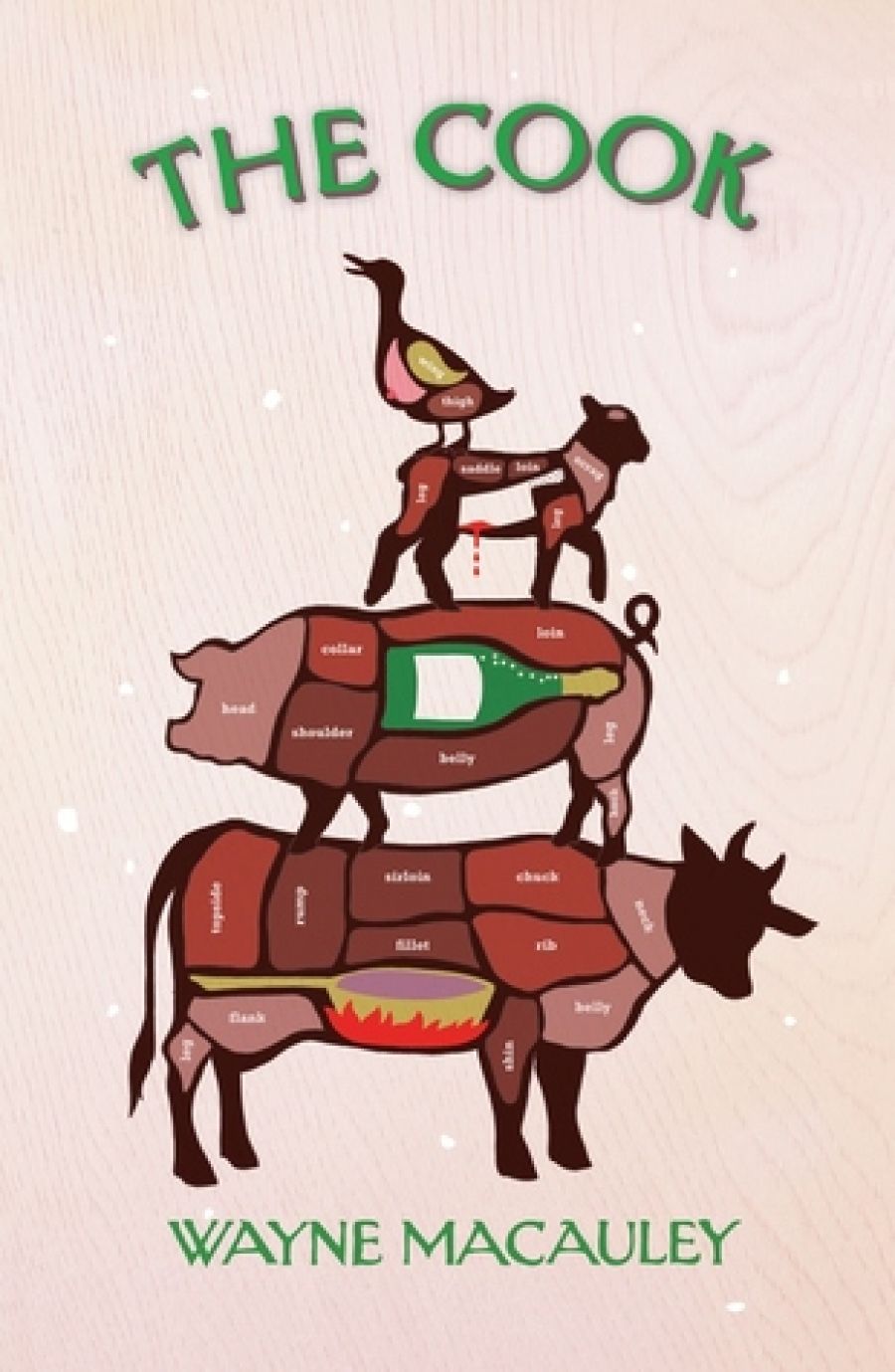
- Free Article: No
- Contents Category: Fiction
- Review Article: Yes
- Online Only: No
- Custom Highlight Text:
For a work that deals heavily with culinary aspirations, it is going to be hard to review Wayne Macauley’s brilliant new novel The Cook without reference to Masterchef, so let’s get it out of the way early. This year, after each new episode of the television show aired, the assorted snark-addled wits of the Fairfax press gathered online to do their mocking work. The mechanics of the show were pulled apart, and the comments section soon filled with the matching-set echoes of disdain and mockery. Filling their prose to breaking point with jokes – it wasn’t a sentence unless it tried to get a zinger away – the gathered souls confessed, through their sneers, that the show was nonetheless utterly compelling viewing.
- Book 1 Title: The Cook
- Book 1 Biblio: Text Publishing, $29.95 pb, 304 pp, 9781921758690
What all that derision and group-sniping couldn’t nail – couldn’t even really get close to – was the deceptive heart of all reality television. At that heart lies a word that, in this country at least, comes loaded with a million political echoes: aspiration. As important as talent – hell, who are we kidding, even more important – is the dream, the vision, the drive. The goal to be something else, something better. It’s a noble-sounding thing, yet run that healthy human desire through the machine of prime-time programming and you’re left with grotesque striving and ‘I have a dream’ platitudes. So where does that leave us? And where does it leave prospective chef Zac, the narrator of The Cook?
The novel’s plot is simple enough: as the story begins, young offender Zac (his misdeeds initially unclear) has been shipped away to a haute cuisine variation of reform school, where, instead of spirit-breaking labour punctuated by bowls of gruel, he is trained to dissect lamb and perfect his reductions. There is a reality-show vibe to the country escape, as Zac competes against other dissolute youth for the approval of Head Chef. As the slow learners fall away, Zac reveals himself to be something of a talent, and with each lesson dreams more and more of his own restaurant, a beautiful wife, and, of course, a television show. But his teachers have something else in mind for him: placement as the in-house chef of a rich Melbourne family. Here is where Zac can begin to make the inner-world an outer reality. And here is where things get a little darker.
Synopsis can, of course, only do so much. What lifts The Cook above mere satire is Macauley’s vision, his tangled world of desire and denial, have and have not; put simply, his language. For this novel, his third, he has ditched standard punctuation beyond the occasional chaos-containing period and dived head-first into the glory of the run-on sentence, all unpunctuated acceleration and sensation. Within a seemingly limited style, he is capable of enormous variation and range. The prose captures everything, all thoughts flying by: fatigue, confusion, rage, information overload, youthful insouciance, moral blankness. A reviewer can’t quote complete lines, merely morsels. There is increasingly fevered foodie prose: ‘a tranche of milk veal with a salmon mousseline white asparagus spears watercress garnish.’ How about Bellovian rapture of detail?: ‘with a mini-ladle in one hand and my small saucepan in the other I bent over very low and very close at the pass and gave my rondelles a splash a smear then a dribble.’ Macauley’s comic touch throughout the novel is superb, and never better than when simply itemising meals – there is a natural and ridiculous comic exuberance in this overlush world, which he captures perfectly.
Of course, there is more than just charged prose at work here. Macauley is a far too deft and undogmatic writer to merely argue from a particular position; a strong sense of outrage at the wealthy and privileged lies deep at the heart of the novel. Macauley isn’t blind to the improvements in Zac’s situation, or to the appeal of luxury, but what he’s charting here are the limits of growth, from promise to psychosis. This is a novel about the screaming mess ninety-nine per cent of the world finds itself in, a populace kept rapturously stuck to a dream decidedly out of reach. If it were less certain of its touch, less dedicated to the sly skew of Zac’s perspective, the book would howl in anger. Instead, something far more interesting takes place.
What Macauley has managed to do with The Cook is find a way to write satire without heavy-handedness, invective without leaden spite, aspiration without artlessness. This is his particular art, and is also the novel’s triumph – it seems to poke in various directions without ever settling on anything concrete, or offering any clear line of argument. Anyone familiar with Macauley’s short fiction, much of it collected only last year in the wonderful Other Stories, will recognise this voice immediately: the everyday strangeness robbed of heavy-handed ‘surreal touches’, the seemingly straight-ahead plot slowly turning odd in an unannounced fashion. From Robert Walser’s Jakob Von Gunten (1909), Macauley has taken not just an epigraph but also an askew sensibility. At other times, I could hear echoes of the unjustly forgotten Witold Gombrowicz. Other readers will no doubt hear their own. Suffice to say, these aren’t the echoes currently bouncing around most contemporary Australian fiction.
The Cook is a book made of the world, made of menus and daydreams and lust. From this material, so commonplace and so frequently given the most everyday treatment imaginable, Wayne Macauley has written a great book.


Comments powered by CComment